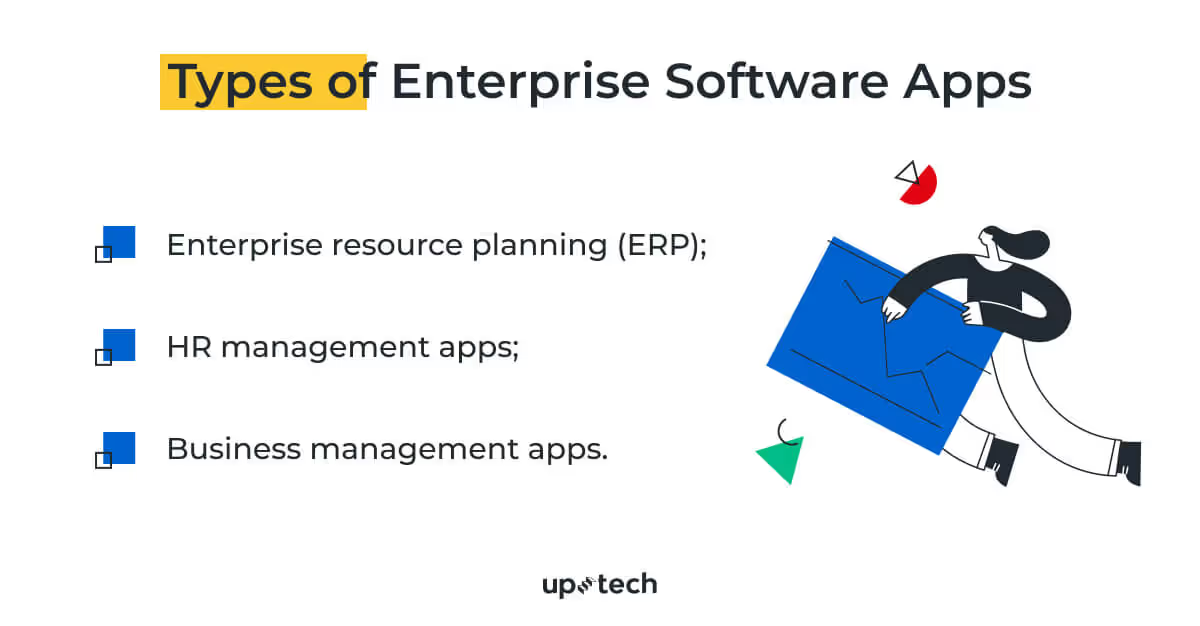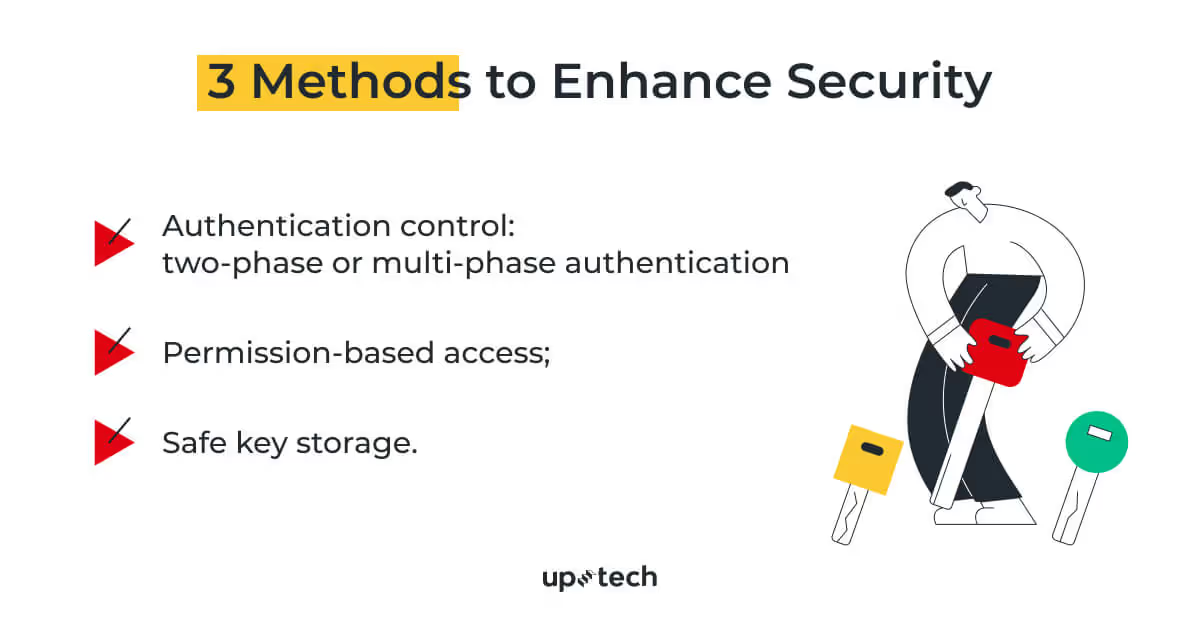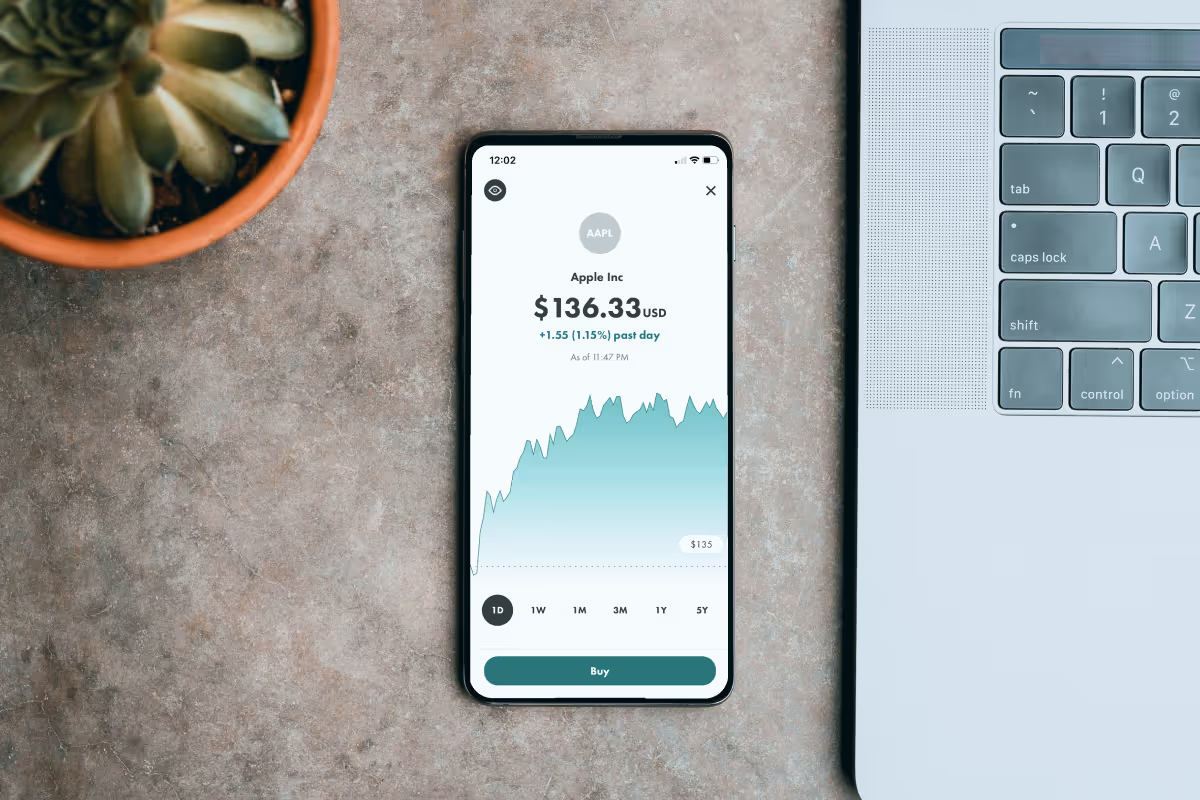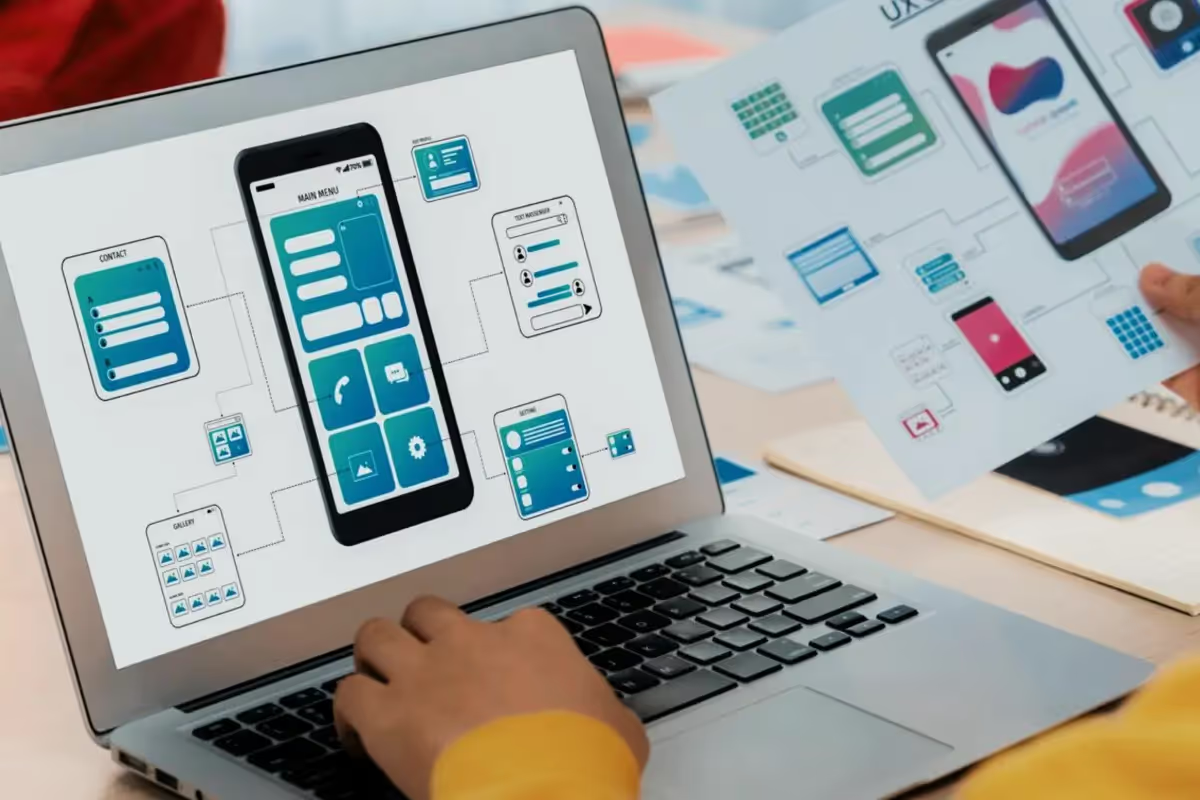At some point, your business grows so big that you cannot handle it with your own hands. In such cases, you need a tool that would help align business processes in your company. An enterprise app could be a great solution in this situation.
Yet, developing enterprise apps is different from other app’s development processes. With extensive databases, numerous integrations, and security issues, developing enterprise applications can be a challenge.
In this article, I will speak about the main features an enterprise app should have, look at the main challenges of such development and give solutions to them from my practice. So let’s dig right in!
.avif)
What is Enterprise App Development?
Enterprise app development is the process of developing scalable apps that help companies facilitate their business processes. For example, an enterprise app helps to:
- Keep company data updated across systems;
- Align company divisions towards common goals;
- Reduce handoff expenses between departments;
- Help management to make data-informed decisions;
- Have a centralized place to manage company processes.
Top 4 Trends of Enterprise Development

In enterprise app development technologies play a disrupting role. Well, like in every area of development, AI or Big Data did not pass seamlessly. So here are top 4 technologies that have recently influenced enterprise app development.
- Microservices. By microservices, we mean a style of app architecture structured from a collection of different services. That said, these services can be independently deployable, built with different technologies, , or have their admin panels. Such a variety of tools involved can speed up the production process significantly, increase system reliability and security
- Cloud-based services. While historically a lot of enterprise software has been hosted on company servers, cloud-based enterprise apps have been slowly taking over the business world by reducing upfront cost and making those apps accessible for small and medium enterprises.
- Big Data in It. Big data stands for large volumes of information that businesses process every day. The high-paced development of big data stresses the importance of enterprise app advancement.
Now companies have many resources to collect data from. However, it is challenging to link, match, and analyse when the information accumulates, which becomes a severe bottleneck for businesses. Enterprise Big Data applications help to systemize large amounts of data and speed up business processes.
- Artificial intelligence. Like with other apps, AI and machine learning took enterprise app development up a notch. Growth in amount of enterprise data makes large companies uniquely positioned to leverage latest developments in AI and machine learning to provide business insights, improve customer experience and stay ahead of competition,
Why Build an Enterprise App?
The main reason for building an enterprise app is facilitating the business processes. However, in every specific case, the motives can be different.
Stay Effective
As your business grows, it is getting difficult to track every little detail of your daily operations. Unfortunately, it can lead to unexpected losses, late payments, and deliveries. An enterprise app will help you unveil inefficiencies that hinder the development of your business.
Maximize Revenue
The more effective your internal operations work, the easier it will be for you to boost your revenue. By this, you can provide the service to a bigger number of customers.
Minimize Losses
By tracking all the processes inside your organization, an enterprise app can help minimize unnecessary spending and see where efforts do not result.
Manage Payment Transactions
It is not easy to manage all payment transactions that take place on your website. Especially, when your business is growing day by day. Enterprise apps can help in managing all the transactions, track deadlines, notifications, etc. You can include various payment methods, including the needs and goals of your organization.
Automate business processes
With an enterprise application, you can avoid big amounts of paperwork and fuss. You can automate your marketing campaigns, data processing, and transaction control and stay calm, that your business goals are met.
Types of Enterprise Software Applications
Talking about enterprise software, we touch a wide range of apps with different functionality and architecture. Here is an unexhaustive list of enterprise apps that developers build most often.

Management Enterprise Apps
One of the most significant software app categories is management apps. Still, this is quite a general definition, encompassing process management software in different areas. For example, HR, ERP, CRM are the spheres where management apps come in handy. So let's break them down into details!
- Enterprise resource planning (ERP) apps are widespread among such business giants as Nestle, Marc Jacobs, or Bosch. The purpose of ERP apps is to manage and integrate all parts of business within one app. Among such processes, I would name planning, cost control, planning, sales, marketing, purchasing inventory, etc.
- HR management apps. Among all business departments in a company, HR values and processes take one of the largest parts. People and values play a crucial role in the life of a company. But behind any solid corporate culture, there are strict processes, deadlines, and actions. Such apps as Zoho People, WorkBright, Clear Company, and WorkStyle help streamline the multi-layered HR departments' work.
- Business management apps. This type of app is usually made to increase the productivity of businesses. For example, such apps as Promapp, KiSSFLOW, MDM Software, and Nintex can integrate into the company's existing architecture and improve the workflow from the vantage ground.
Team Collaboration Software Apps
Another group of enterprise apps will include the software for team collaboration and communication. I bet you already know or even use such apps: Slack, Asana, Liferay, Monday.com – all these software help to keep your team connected and synced on the company’s milestones.
Such apps offer many benefits: browser-based, flexible, synchronizing, feature-having, agile-focused. These apps help teams collaborate effectively regardless of where they are. Here I would name two types of apps:
- Customer Relationship Management (CRMs) – software that allows staying in touch with existing and potential customers.
- Content management systems (CMS) are essential for creating and editing digital content or everyday workflow.
Analytic Software Applications
It is crucial for businesses nowadays to process data and leverage it for the benefit of companies. Thankfully, such analytical apps as Tableau, PowerBI help to read, process, and extract data to use for the advantages of the business.
Storage Enterprise Apps
At some point in time, businesses can face the need to systemize and store the content. Storage enterprise apps help to retain content according to the business standards and principles of the company. Examples of such apps include SnowPlow, StitchData.
Enterprise Apps Must-Have Features
Sadly (or not), there is no all-for-one list of features for an enterprise app. Instead, the list of features is defined for each enterprise app individually and entirely depends on the business needs of a particular organization. But to make it more transparent, I have prepared a list of the most common features. So here are the features you might want to include when building an enterprise app:
- Extensive Databases;
- Multiple User Roles;
- Third-Party App Integrations;
- Real-Time Analytics;
- Instant Messaging.

Extensive Databases
Enterprise apps are corporate systems. For that reason, they deal closely with user data and data transfers. All this information is held in special storage named enterprise databases.
Putting it simple, databases are collections of tables that hold information about people, goods, and assets with all the characteristics and details.
As the information in databases is constantly changing, the tables must be scalable and secure. Also, databases should be consistent across all devices and platforms with no lags or downturns.
Multiple User Roles
Enterprise apps are built for the advantage of all users in the organization. Yet, not all the information in the app should be open to all the participants. This is what user roles are designed for. They create permission for certain groups of people to perform particular tasks and use a specific part of the information in the enterprise app.
For example, your partnering delivery company performs the user role of a “deliverer”. This person can see the order details, customer information, address of delivery, etc. However, this person will not see any other insider information concerning financial statistics or payments. The thing is that, in their user role, such information will not be available.
Third-Party App Integrations
Building an enterprise app is hardly conceivable without partnering with other apps. If you need a task management app, you have Jira, if you want real-time editing, you can integrate Google Docs, and if you want a project-planning and tracking software, you can use Toggl. And these are just a few examples of the fruitful integrations that you can make. So take it rationally, and instead of reinventing the wheel, take advantage of the existing apps by partnering with them.
Real-Time Analytics
Enterprise app is a platform for interaction of hundreds of people. This is especially true, in the time of remote team collaboration. To avoid any slowdowns in data processing, you need your enterprise app to be real-time updatable.
Instant Messaging
One of the goals of an enterprise app is to provide a space for people in your organization to interact with each other. So integrating chat functionality into your enterprise app would be an excellent idea as it allows for smooth interaction between employees and helps with keeping record of historical changes to some files.
.avif)
Tips in Building Enterprise Apps
An enterprise app is quite a specific type of software, including many basic features, side functionalities, integrations, and processes. There is no need to stress how challenging that might be to synchronize all those processes.
Align All Process Operations
An enterprise app is software that you build individually for your company. Some (or even many) features in such an app need to be customized specifically to the needs of your business.
For example, for ordinary apps, developers usually integrate a ready-to-go admin panel, instead of building it from scratch. This is a reasonable solution for most cases, as it saves you time and shrugs off unnecessary efforts.
However, this solution may not work for an enterprise app. Enterprise apps are compex, they need to align many business processes all in one. So, as surprising as it is, you might need to create your own customized admin platform if your business claims for that.
Security issues
Like any other corporate system, enterprise apps are very much connected with databases. Unfortunately, there have been multiple cases when these systems were hacked, and information got abused by intruders. Such cases can lead to manipulations with users’ sensitive data and eventually bring damage to your company’s reputation. This is why high-security standards are at the cornerstone of enterprise app development.
Here are some protection mechanisms that you can use to provide security in your enterprise app:
- Authentication controls: (2FA) or multi-factor authentication;
Integrating 2FA means that you ask your user to go through two phases of authentication. At the first one, the user says who he is (by email and password). At the second one, they need to provide some more information to enter (for example, personal identification number, answering “secret questions”, or specific keystroke pattern.)
- Permission-based access;
Using permission-based control, you can open specific data only to the accounts, permitted to see this information. Thus, when a user logs in, the system can record the user’s account name and the client machine, from where they logged in. All operations of this machine will be ascribed to a certain account, until they log out.
- Safe key-storage
The most basic rule here is to keep your access keys in a safe storage to prevent any intrusions from third-party users. Digital media work well, but having an old-fashioned paper note with all the keys does not hurt.

Competing with simpler solutions
However elaborate your app might be, there is always a probability that a specific problem already has a solution. All in all, many analytical tools help businesses handle their tasks – Excel, Google Sheets. This is why simply building pure functionality might not be enough. Your enterprise app should have a competitive edge, unique offer, or enter a new niche to stay competitive in the market.
Responding to changes
An enterprise is usually quite a dynamic system that constantly evolves. Like with any self-maintained system, you cannot always predict every tiny detail. So surprises happen, and they are not always pleasant ones.
So being ready to confront such unexpected events immediately is vital for your business’ success.
.avif)
Conclusion
Enterprise app development is a complicated process including many issues that need thorough consideration. For example, security, third app integrations, handling unexpected events are just a few factors that form the bedrock of your enterprise apps’ development strategy. However, these features are investments into your organization’s competitiveness.
At Uptech, we emphasize discovering users’ real needs and building products with users in mind. Contact us to learn more about what features need to be included in your enterprise app.
























































































.avif)











